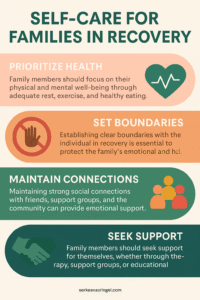If your family is dealing with the challenges of addiction, self-care often ends up at the bottom of the list. I know how easy it is to get caught up in crisis mode, worrying about your loved one and juggling everything else on your plate. The thing is, looking after yourself isn’t selfish. Self-care can help you cope and keep your family steadier during a tough time. Here are some strategies families can use to build resilience and keep moving forward.
Understanding Self-Care in the Context of Family Addiction
Addiction affects entire families, not just the person who’s using. Stress, anxiety, and uncertainty often stick around, and sometimes feelings of guilt, anger, or even shame can mix in. Self-care is about tending to your needs, so you have the stamina and clarity to show up for yourself and your loved ones.
Acknowledging the impact addiction has on the whole family is really important. According to the Substance Abuse and Mental Health Services Administration (SAMHSA), family members are more likely to experience stress-related health problems and emotional burnout. Developing a self-care routine can help buffer some of those effects and offer a way to reclaim your own sense of calm and control.
When families deal with addiction, the stress can feel overwhelming and lead to a constant sense of unpredictability. Taking even small steps towards self-care can provide a much-needed lifeline. It’s easy to lose your sense of self, so remember it’s okay to find simple ways to meet your needs and support your loved one. By paying attention to your own well-being, you can better support your entire family.
Starting with the Basics: Physical Self-Care
You might feel like you don’t have the time or energy to focus on physical health right now, but some simple habits can make things more manageable. Here’s what I find helps:
- Stick to a simple routine. Regular mealtimes and sleep routines can stabilize your mood and energy, even if things seem to be falling apart.
- Move a little every day. Walking around the block can help you clear your head and relieve stress.
- Don’t skip meals. It’s tempting to prioritize everything but your nutrition, but eating something, even if it’s just easy snacks, helps you stay more balanced.
- Prioritize sleep where you can. Being rested makes a big difference in how you handle stress. Short rest breaks or relaxation exercises during the day are worth trying if sleep is hard to come by.
The key is to start small. While overhauling your whole lifestyle may not be possible, incorporating one or two physical self-care practices can help you feel more grounded in chaos. Over time, these small steps add up and help you weather the turbulence that addiction can bring to a family.
Emotional Self-Care for Family Members
Addiction brings up a storm of feelings. It’s normal to cycle between hope, disappointment, anger, and fear. Looking after your emotional health doesn’t make you less caring; it helps you show up more steadily.
- Be gentle with yourself. You’re facing a challenging situation. Try to notice your self-talk, as it’s easy to go down the “I should have done this” path. It’s okay to have mixed feelings about your loved one and the situation.
- Find ways to express your emotions. Journaling, art, or even talking to a pet can help release feelings that build up inside.
- Allow yourself breaks from the problem. Watch a goofy show, listen to music, or get outside. It’s restorative, not avoidant.
Sometimes the emotional toll of a loved one’s addiction sneaks up on you. Paying attention to signs of emotional strain—like withdrawing from friends, feeling irritable, or losing interest in things you enjoy—can signal it’s time to prioritize self-care. Surrounding yourself with supportive people, whether friends, family, or a professional, makes facing emotional challenges easier.
Drawing Boundaries and Protecting Your Energy
Boundaries set the limits for what you can do and where to draw the line. When a family member struggles with addiction, boundaries can get blurry. You might feel responsible for fixing everything or worry that saying “no” isn’t loving, but protecting your energy is part of healthy support.
- Decide what you are and aren’t willing to do. It’s totally okay to set limits. For example, you might help track down treatment resources but not cover specific expenses or bail your loved one out of trouble.
- Share limits with kindness. Boundaries land best when you explain them calmly, without anger or blame. Practice phrases like, “I care about you, but I can’t do that.”
- Consistently enforce boundaries. Sticking to your limits protects you from building resentment, even when it’s awkward or brings up guilt.
If you’re used to stepping in, learning to say “no” may take time, but holding the line can help you and your loved one see what healthier roles and responsibilities look like. Remember, clear boundaries make room for healing.
Getting Support: You Don’t Have to Go It Alone
People who love someone struggling with addiction often feel isolated; it’s not always something that comes up in everyday conversations. Opening up to trusted folks or support groups can be a total game-changer.
- Support groups are super helpful. Programs like Al-Anon, Nar-Anon, or local community services offer listening ears and practical advice. It helps to talk with people who really get it.
- Consider individual counseling. A mental health counselor can help you process emotions, learn coping skills, and strengthen your boundaries.
- Lean on friends and family. Even if you don’t talk about addiction directly, spending time with people who care about you is a reminder that you aren’t alone.
Seeking support is not a sign of weakness. Knowing others have faced similar situations offers comfort and a new perspective. For extra encouragement, contact your faith community, workplace resources, or even online forums.
Taking Care of Your Mental Health
Living with addiction in the family is a marathon, not a sprint. Stress, anxiety, and depression are pretty common in this situation. Looking after your mind is part of daily self-care too.
- Try mindfulness or relaxation exercises. Breathing exercises, guided meditation, or even a few quiet minutes outside can help. There are free apps and videos worth checking out, like Insight Timer and Calm.
- Stay connected to your interests. Whether crafting, fixing things, or gardening, keeping up with a hobby, even on a small scale, reminds you of who you are outside the crisis.
- Watch for signs of burnout. If you notice you’re constantly exhausted, hopeless, or just “checked out,” reaching out for extra support is smart.
It’s normal to struggle with mood changes when you’re under chronic stress. If anxiety, sleeplessness, or sadness start to take over, don’t hesitate to check in with your doctor or counselor. Sometimes, a mental health journal or mood-tracking app can help you spot patterns and see what helps you feel more at ease.
Talking to Kids About Addiction in the Family
Kids pick up on more than we think, even if you try to hide the problem. They might feel worried, confused, or responsible for the issues. Explaining things simply, age-appropriately reassures them that they’re not to blame and can talk about their feelings.
- Use honest, simple language. Something like, “Dad has a problem with alcohol and is getting help. It isn’t your fault, and you can always talk to me about your feelings.”
- Encourage their questions. Let them talk, ask, or even be angry. Kids need space to process, just like adults do.
- Watch for signs they need extra help. If they’re acting out, feeling sad, or struggling in school, a school counselor or therapist can step in to support them.
Involving children in family routines and reassuring them of your love and stability can also help. Consider checking out children’s books or resources designed for kids affected by addiction so they feel less alone.
Everyday Self-Care Ideas for Busy Families
When you’re stretched thin, self-care can look really small, and that’s okay. Here are some everyday strategies I recommend:
- Set aside a few minutes for yourself each day. Whether drinking your coffee in peace or soaking in a bath, little pauses help a lot.
- Create comforting routines. Quiet mornings, family dinner without screens, or bedtime stories with your kids add steadiness when things feel unpredictable.
- Write down what’s working. Jotting a quick note about something you did well, or something good that happened, resets your focus and builds resilience.
You can also keep a self-care checklist on your fridge or phone to remind you to check in with yourself daily. It might seem small, but it aims to turn self-care into a regular (and guilt-free) habit.
Common Challenges and How to Find Your Way Through Them
- Guilt about focusing on yourself. Families often feel that spending energy elsewhere means abandoning their loved one. Reminding yourself that self-care strengthens your ability to help is super important.
- Resistance to outside support. Sometimes, people hesitate to join groups or ask for help, worrying about privacy or being judged. Most support groups are confidential and welcoming, so trying one out can be low risk.
- Staying consistent. It’s tough to maintain self-care practices during a crisis. Returning to them after slipping up is better than not starting.
If you miss a day or lose track of your self-care plans, don’t be hard on yourself. It’s completely normal—every day is a fresh start. Over time, you may find new routines that support your mental and physical health, making it easier to handle whatever comes next.
Frequently Asked Questions
Question: What if my loved one refuses to get help? Should I push harder?
Answer: You can encourage treatment and share resources, but can’t force change. Focusing on things you can control, like getting support for yourself and setting boundaries, keeps you stronger in the long run.
Question: Is it normal to feel angry or resentful?
Answer: Yes, those feelings are common. Finding ways to vent them safely, like through support groups or creative outlets, helps prevent them from building up and hurting your relationships.
Question: How can I keep strong relationships with other family members?
Answer: Try to separate time for fun or ordinary things that don’t involve discussing the addiction. This helps keep connections alive outside the stress of the problem.
Final Thoughts
Self-care for families affected by addiction is an ongoing process, and no single approach fits every family. Building routines, reaching out for support, and tending to your physical and emotional health keep you steadier as you support your loved one. Every step to care for yourself helps bring balance, one small act at a time. By staying gentle with yourself and seeking support when needed, you’re helping your family weather difficult times. Remember, even in the most challenging moments, you deserve care and kindness.
Video: 10 Things Experts Know About Self-Care in Recovery That You Don’t

